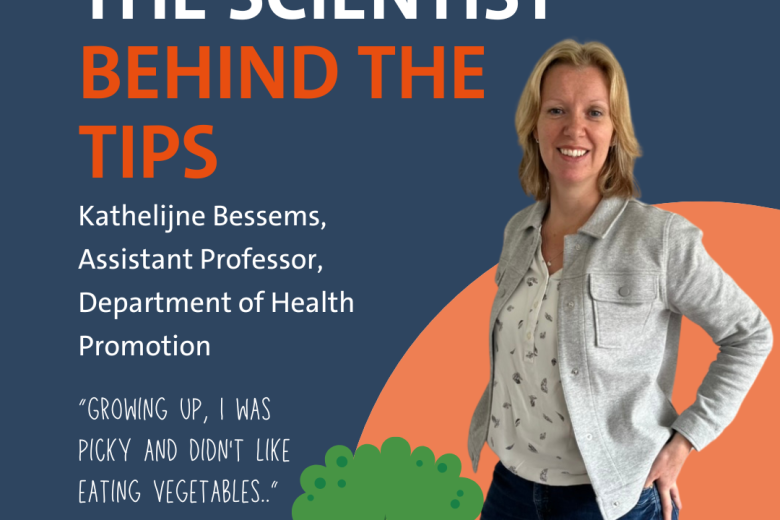Studying with ADHD: tips to avoid concentration problems and planning issues
Concentration problems. Troubles with planning. Quickly getting distracted. These are all familiar symptoms of ADHD. More and more UM students report ADHD problems to Disability Support. In what ways is ADHD getting in the way of studying? And how can you reduce ADHD symptoms during your studies? We talked about these issues with Sigrid Péters and Kristie Stoelers, who both work at Disability Support, and biological psychologist dr. Martijn Arns of Brainclinics Foundation. Arns has observed an important relation between ADHD symptoms and sleep.
ADHD symptoms are more frequent
Students with ADHD symptoms are increasingly reporting to Disability Support because they encounter problems while studying. Previously, dyslexia was the most common disability reported by students, but nowadays, ADHD has taken that place. Péters can think of a couple of reasons why this is the case: “More has become known about ADHD, leading students to recognise the symptoms better, resulting in more diagnoses and more of them coming to us for help.”
Stoelers adds to that: “During your time as a student, ADHD symptoms often become more apparent. You might find yourself moving to a new city, immersing yourself in student life, and needing to plan more independently for your studies. The time at university is one filled with many stimuli, both in and outside of your study. On top of that, students often feel pressured to get a side job and participate in lots of social interactions. For students with ADHD, this period can be extra overwhelming.”
ADHD symptoms during your studies
ADHD is different for everyone. Students who suffer from ADHD often face similar problems. However, the extent to which specific symptoms affect them varies per person. At Disability Support, Péters and Stoelers see students with the following problems:
- trouble finishing tasks;
- trouble meeting deadlines;
- procrastination;
- concentration problems;
- problems with planning and organising study tasks
- quickly getting distracted;
- brain fog (feeling like your head is ‘full’).
The symptoms above may apply to ADHD and ADD (a subtype of ADHD). ADHD often also includes hyperactivity and impulsivity; this is not the case with ADD. In addition to these hindering characteristics, students with ADHD are often also creative, versatile and social, and sometimes have a good hyperfocus.
The time at university can be extra overwhelming for people with ADHD because of the many stimuli and expectations. In and outside of the study.
Kristie StoelersThe influence of blue light and sleep deprivation on ADHD symptoms
Dr. Martijn Arns, who has been researching ADHD symptoms and ways to reduce them for years, also sees an increase in ADHD symptoms in society. In his research he discovered that two important lifestyle factors can cause or worsen the ADHD symptoms mentioned above.
Firstly, Arns noticed that ADHD symptoms are often connected with chronic sleep deprivation. “If for a long time you get too little sleep, for example six hours per night, you will soon notice (more) ADHD-like symptoms,” he explains. “After just four weeks, your cognitive functioning, attention span and working memory deteriorate. The consequences are just as bad as if you haven't slept at all for two nights. It's just that in this situation, people are not aware of it.”
Secondly, Arns observed that blue light can cause or worsen ADHD symptoms. “Nowadays we use a lot of LED lamps, which have a peak in the blue spectrum. Mobile phones and other devices also emit blue light. The sky is blue, so our brain sees blue light as a sign that the day is starting and we should be alert. For example, if you spend a lot of time on your phone in the evening, it will be more difficult for you to fall asleep. Avoiding blue light helps to maintain your concentration and to suffer less from ADHD-like symptoms.”
UM offers help to students with ADHD
Péters and Stoelers often hear that students with ADHD think they are the only ones facing ADHD symptoms during their studies. But they are not, according to Péters and Stoelers. “There is a very large group of students with ADHD. That is why we think it is important to bring students together, for example during training or in the UnliMited Network.”
At the same time, the symptoms differ per person and therefore tailor-made solutions are required. The Disability Support team always takes each student’s obstacles into account and considers what is helpful for that specific student. Péters explains: “Often, arranging extra exam time or a smaller exam room with fewer stimuli can already be helpful.”

Dr. Martijn Arns is a biological psychologist and works as an Associate Professor in Cognition and Cognitive Neuroscience at the Faculty of Psychology and Neuroscience. He has his own research institute called the Brainclinics Foundation, which strives to better understand psychiatric disorders through brain imaging and sleep, among other things. The aim is to provide more personal advice for mental problems such as ADHD, depression and obsessive-compulsive disorders.
Poor sleep and being overexposed to blue light can cause or worsen ADHD symptoms. It is important to monitor this!
Dr. Martijn ArnsWhat help does UM offer?
UM offers help to students with ADHD in several ways:
- Send an email with your question to Disability Support via disability@maastrichtuniversity.nl or come to the walk-in consultation hours, every day from 11.00 to 13.00. You can discuss your situation there.
- Schedule an appointment with Disability Support. You can do this via disability@maastrichtuniversity.nl. Students who are still in a diagnosis process for ADHD are also welcome.
- Visit the workshops of the UM neurodiversity team for students with ADHD and/or autism. EDLAB offers separate workshops for teachers.
- Join or visit the events of the UnliMited network: a network for and by UM students and UM employees with (in)visible functional limitations, chronic diseases and neurodivergence.

Kristie Stoelers is an employee at Disability Support. Stoelers is also involved in UnliMited: a network for and by UM students and UM employees with disabilities.
Photo: Joris Hilterman
Tips for studying with ADHD
What can you do yourself if you run into study problems due to ADHD? Stoelers and Péters emphasise that the solutions differ for every student with ADHD. But they do have a few general tips:
1. Investigate what causes brain fog, or makes your head feel so "full". What do you do in a week and which activities cost you a lot of energy? What can you change to avoid structurally overstepping your boundaries?
2. Find an outlet to process stimuli. This could be a sport, for example, but also a creative hobby such as crocheting.
3. You can use reading software. Taking in information in a different way (while listening) can improve your concentration. This software is available from Disability Support.
4. Visit the ADHD Café in Maastricht. There, young people and adults with ADHD meet each other in an accessible way to exchange experiences. The ADHD Café takes place every first Friday of each month. In addition, there is an ADHD meet-up at The InnBetween every second Friday of each month.
5. Seek help from Disability Support. Disability Support does not offer treatment, but can support you with your studies. In addition, your study advisor can help with study-related questions.
In addition, Arns sees an important solution in lifestyle adjustments to experience less ADHD symptoms:
6. Ensure a good sleep rhythm. Does it take you longer than half an hour to fall asleep? Then go for a walk outside in the morning. Light in the morning helps to get your biological rhythm going.
7. Grab every opportunity to go outside. For example, run a lap in the morning or cycle to university. Travel by car or public transport less often.
8. Turn off blue light on devices. There is often a special setting for this, such as Night Shift for Apple devices or “night mode”. Otherwise, set the brightness of your screen as low as possible.
The most important advice that Stoelers and Péters want to give? “Look at what is helpful for you, but also reach out to others. Students with ADHD often feel alone in their struggles, while there is a very large group of people with ADHD symptoms. It is helpful to know that you are not the only one.”
Text: Romy Veul
Student Sofie’s experiences
Sofie is in her third year of European Studies. Recently, she was diagnosed with ADHD. What does she want to tell other students with ADHD (symptoms)?
“When I was diagnosed with ADHD, many puzzle pieces fell into place. I have always had trouble planning and organising. It’s also difficult for me to distinguish between main and side issues. When I read a text, every sentence seems important. That's quite tiring.
In retrospect, I think it’s a pity that I was diagnosed so late, now that I see what services Disability Support offers. If I had been diagnosed earlier, the facilities would have saved me a lot of stress during exams. Extra exam time or a smaller exam room is a solution when it comes to ADHD. The large exam halls were always very overwhelming for me. What I would like to say to other students is: 'Sound the alarm on time if you suspect ADHD'. You will notice how much help is possible.”
Also read
-
Europe Day
To celebrate Europe Day on 9 May, FASoS student Lisa travelled to Brussels to meet with five of our inspiring alumni who are currently shaping European policy and advocacy. In this video, they share why Europe Day matters, how it’s celebrated in Brussels, and what the idea of Europe means to them.

-
The Green Office Catalyses Circularity Projects’ Autonomy
This semester, the Green Office cultivated the untapped potential of the Community Garden and the Clothing Swap Room. We hope that these Circularity Projects will operate under autonomous, functional organisations by this time next year, with continued support from the Green Office and the SUM2030...
-
Evidence-based health tips for students: the science of eating healthy
In the upcoming months, we’ll share tips on Instagram for our students on how to live a healthier life. Not just a random collection, but tips based on actual research happening at our faculty. The brains behind this idea are Lieve Vonken and Gido Metz, PhD candidates at CAPHRI, the Care and Public...
